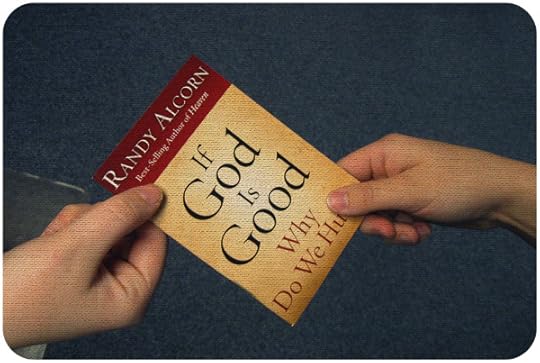Randy Alcorn's Blog, page 186
February 17, 2014
It’s about Jesus and His Plan: Why I Believe We Shouldn’t Give up on the Local Church
 Later in this post I’ll link to a blog with thoughtful insights from Ed Stetzer, where he talks about his disagreement with Don Miller’s view about attending church services. But before that, there are a few things I need to say.
Later in this post I’ll link to a blog with thoughtful insights from Ed Stetzer, where he talks about his disagreement with Don Miller’s view about attending church services. But before that, there are a few things I need to say.
First, contrary to many assumptions people have made in past comments when I say something good about the local church, I’m not a pastor, elder, or church lay leader. I was a pastor for 14 years, until 1990, but for 24 years I’ve had to submit to the decisions of my leaders, whether or not I agree with them, just like everybody else. That’s been humbling and healthy. So I’m not trying to get people to pay me more money, inflate my attendance numbers, or manipulate or control people in “my flock.” I have no flock, though I’m part of one.
Have I ever been tempted to walk away from the local church? I sure have. There have been two seasons of my life like that, one where I experienced what felt like disloyalty, when some church leaders and families were not standing behind me and my wife when we had made some hard decisions we believed (and still believe) God led us to make. When we most needed support, we didn’t get it. (And, yet, from others we got plenty of it, and lots of support from a small number of people is often what the church is about.)
We stuck with church because it was about Jesus, not us, but in the long run we were the beneficiaries. Forgiveness came not because we backed away from people, but because we stuck with them, realizing we were just as imperfect as they were.
Not many years ago our church went through a crisis in which leaders became divided against each other, and people chose sides. People on both sides met with each other to recite their grievances, and some came to me, absolutely convinced they were 100% right and the others were 100% wrong. When I pointed out that there was truth on both sides, this didn’t go over well with anyone. I felt isolated and disillusioned.
I got sick and tired of what seemed to be whining on both sides, yet I also saw there were deep hurts and most importantly, Jesus loved all these people. I didn’t want to attend church services and sometimes I didn’t. But then over time God brought great healing to the church. We were able to have a small part in that, but more importantly we were able to witness the work of God. In either case, had we left our church we would not have been there to see God work. We would only have the flaws to remember, not God’s work of grace in the hearts of His imperfect people. And we would be sitting here self-righteously thinking of ourselves as superior to those “church people,” when in fact the problem with those church people is not that they aren’t like us, but they’re too much like us.
Of course, I understand there is a time to leave a church. Thirty-seven years ago I left the church where I came to faith in Christ, as part of a group that planted my second (and so far last) church. There were hard feelings on both sides, but I also saw God heal many of those wounded relationships.
Our church, which we’ve been part of since it began in 1977, is very imperfect. In other words, it’s like us. But there is a sincere desire in the leaders to follow Jesus, obey Him, share the gospel, support missions and help the needy locally and around the world. There really ARE churches like that, all over the country, and if you’re not in the U.S. there are some in your country too. (If not, find some like-minded people and consider starting one.)
Nanci serves the church by leading a women’s Bible study group, and being part of a team of women who write study lessons (they invest countless hours on a weekly basis, with the payoff of fruit in their lives and that of hundreds of women at our church). Had we left our church the two times we really felt like it, she wouldn’t have served in or been the beneficiary of this amazing ministry.
All churches are very imperfect. The old saying is true: if you find a perfect church, don’t join it, because it won’t be perfect any more.
 In fact, one of the things our ministry does is help people find local churches that teach God’s Word and seek to follow Him. I have a note to that effect in most of my books, offering our help, and many people have taken us up on it. By God’s grace we’ve been able to see many people become part of churches they love, where they are taught and serve.
In fact, one of the things our ministry does is help people find local churches that teach God’s Word and seek to follow Him. I have a note to that effect in most of my books, offering our help, and many people have taken us up on it. By God’s grace we’ve been able to see many people become part of churches they love, where they are taught and serve.
If you’re tempted to set yourself above all churches, thinking you’re better than the people there, and if you say, “I’ve tried church, but I’ve given up, there are no good churches,” I would ask, “Really? NONE? How could you possibly know that?” (“We’ve visited a half dozen of them, and they’re no good” isn’t a good enough answer.)
I would encourage you to remind yourself of what I’ve had to say to myself when I’ve been disillusioned with church: “It’s not about me.” It’s about Jesus and His plan, His church, and His Word that tells us we are to be part of a local “body of Christ.”
In many cases, it’s not just that we’ve had bad experiences at churches. (Of course we have, and we’ve also been part of other people’s bad experiences at church.) It’s that we don’t like being under authority and having to follow someone else’s lead. We want to be in charge. We don’t like Hebrews 13:17, “Obey your leaders and submit to them, for they are keeping watch over your souls, as those who will have to give an account. Let them do this with joy and not with groaning, for that would be of no advantage to you.”
Yes, I’m fully aware some churches and some pastors are not true to Scripture. Fine. Be part of another church. Yes, I know that Christians can assemble for fellowship and certainly don’t need a church building. I am not talking about church meetings; I’m talking about church. But churches in the New Testament weren’t just getting together for coffee or even sharing what they were learning from the Word (great as that is, and it should be happening in every church.) Churches have elders, teachers, leaders and people who serve in different roles. There is accountability.
We don’t like Hebrews 10:25. I get that. Maybe we should hear it in a few other translations. The Complete Jewish Bible renders it, “not neglecting our own congregational meetings, as some have made a practice of doing, but, rather, encouraging each other.” The Contemporary English Version says, “Some people have gotten out of the habit of meeting for worship, but we must not do that…”
I know, I know. There are a thousand reasons not to do that. But I can think of several good ones that outweigh them:
1) God said it.
2) God knows better than I do.
3) God is in charge, I am not.
4) Whenever I have obeyed God, I and my family have ultimately benefited.
5) Whenever I have done it my way instead of God’s, with all my rationalizations and excuses that I’ve considered sound reasoning, it hasn’t been for His glory, for my good or the good of others.
I encourage you to read through Ed’s excellent post:
Should I Stay or Should I Go Now? Why We Should Choose Church Anyway
Donald Miller, perhaps best known for writing the book Blue Like Jazz, has stirred up the Evangelical internet this week with a blog post detailing why he rarely goes to church.
Let me say, I appreciate his honesty and enjoy his thinking, which is often out loud and causes worthwhile discussions. He provokes—and that's what good writers do.
Miller writes that hearing sermons and singing songs is not how he connects with God. He says this causes church services to be difficult for him. He doesn't go often because, he says, "It's not how I learn."
So how does Miller find intimacy with God? He continues:
The answer came to me recently and it was a freeing revelation. I connect with God by working. I literally feel an intimacy with God when I build my company. I know it sounds crazy, but I believe God gave me my mission and my team and I feel closest to him when I've got my hand on the plow.
A few years ago, I was at a similar place. I had been the interim pastor at a church of 9,000 members. I loved the church, the people were great, but I just showed up on Sunday and preached. I lacked community with them.
Then I was done serving at that church and was suddenly an attendee and not the pastor. I, too, found I don't get much out of sermons, even the good ones. Honestly, there is not much new content I learn at church. Finally, I am easily distracted and the slow pace of sermons lets my mind wander, so I'd rather read a good sermon than listen to one.
So, I could've just stayed home.
But, I didn't. And neither should you. Church is more than sermons and music, it's community, mission, ordinances, and so much more.
Our church involvement is not just anticipated (1 Corinthians 12:27), but commanded (Hebrews 10:25).
I took some time over the last few days thinking over the issues Miller raised. The more I think on it, the more I see his comments are worth noting, but not emulating. Here are three reasons I found for attending (and committing to) a local church and why I think you (and Don) should.

Photo credits : Cross photo by linder6580 via sxc. hu | Church service by Capt Kodak via photopin cc |
February 14, 2014
God Doesn’t Love Us on Our Preferred Terms, But on His Own
 After God revealed His name to Moses, “He passed in front of Moses, proclaiming, ‘The LORD, the LORD, the compassionate and gracious God, slow to anger, abounding in love and faithfulness, maintaining love to thousands, and forgiving wickedness, rebellion and sin’” (Exodus 34:6–7).
After God revealed His name to Moses, “He passed in front of Moses, proclaiming, ‘The LORD, the LORD, the compassionate and gracious God, slow to anger, abounding in love and faithfulness, maintaining love to thousands, and forgiving wickedness, rebellion and sin’” (Exodus 34:6–7).
God’s love abounds. It proliferates. It’s overflowing, even excessive—something all sufferers need to hear.
The most compelling proof of God’s love is giving His Son to die for us. “This is how God showed his love among us: He sent his one and only Son into the world that we might live through him. This is love: not that we loved God, but that he loved us and sent his Son as an atoning sacrifice for our sins” (1 John 4:9–10).
God’s constant love for us will never let us down, no matter how things appear. We often define love in superficial and trivial ways, setting us up to question God’s love in hard times. Yet notice how our spiritual forebears saw his love:
The LORD’s unfailing love surrounds the man who trusts in him. (Psalm 32:10)
Have mercy on me, O God, according to your unfailing love. (Psalm 51:1)
Though he brings grief, he will show compassion, so great is his unfailing love. (Lamentations 3:32)
We cannot see the end God has in mind. If we could, we would likely see that the hardships God allows prevent even more debilitating hardships—the by-products of the diminished character that results from a life of ease.
Our problem is not that we make too much of divine love, but too little. God does not love us on our preferred terms, but on His own. His infinite wisdom ensures us that He gives to us a higher love, not a lower one. C. S. Lewis writes in The Problem of Pain,
We want, in fact, not so much a Father in Heaven as a grandfather in heaven—a senile benevolence who, as they say, “liked to see young people enjoying themselves,” and whose plan for the universe was simply that it might be truly said at the end of each day, “a good time was had by all.”...I should very much like to live in a universe which was governed on such lines. But since it is abundantly clear that I don’t, and since I have reason to believe, nevertheless, that God is Love, I conclude that my conception of love needs correction.”

Related Resources
Blog: God's Limitless Love
Book: If God Is Good
Stock photo credit: Zela via rbgstock.com
February 12, 2014
Books as Seeds: The Power of Giving Away Literature
 One of the things I often do is give away books and booklets to people I meet. Wonderful things have happened over the years because of this simple act, and I’ve come to see books and literature as “seeds” we can sow to share the good news about Jesus. Not all of them will grow and bear fruit, but some of them will.
One of the things I often do is give away books and booklets to people I meet. Wonderful things have happened over the years because of this simple act, and I’ve come to see books and literature as “seeds” we can sow to share the good news about Jesus. Not all of them will grow and bear fruit, but some of them will.
Ever seen grass grow through asphalt? It’s amazing if you think about it. How does grass, pressed flat and robbed of light, persevere? Yet we’ve seen it. Somehow God made those tiny blades of grass to rise to the greatest challenge. If a plant can grow through asphalt, God can use anything—including a book—to break through the darkness of someone’s life!
I think of Jesus’ parable of the sower (Mark 4:1-20). When we “sow” books, we don’t know which people are “good” ground ready to accept the seed, and which people are “bad” ground, who ultimately won’t respond to the Gospel. But look at what happens when the seed does find fertile ground: “And other seeds fell into good soil and produced grain, growing up and increasing and yielding thirtyfold and sixtyfold and a hundredfold” (Mark 4:8).
Nanci and I were at a dog show a few weekends ago, and my coat pocket full of booklets was nearly empty by the time we left. Every time I had a nice conversation with someone (including two shuttle bus drivers), usually about dogs, it was a natural thing to give them a booklet. Will some of those booklets be tossed without being read? Probably. But some will be read, whether immediately or three years from now. Who knows what God may do through His Spirit and His Word in those lives?
My friend George Verwer is an example of a man who has given away hundreds of thousands of books over the years (including through Operation Mobilization’s Logos Hope ship which gives away books in ports around the world). In a speaking event I did with George, he shared a challenge with listeners: “We want you to learn to pass books on to others. You can be one of the most shy people, finding it very hard to share your faith, very hard to talk about spiritual things (and I can understand that in the present American culture), but giving a book— it can speak fantastic language. You will be laying up treasure, and there will be people coming to Jesus through your books.”
George is right—anyone can give away a book. It can be as simple as leaving one (along with a generous tip!) for a waitress or waiter who serves you, leaving a book at a doctor’s waiting room, or just keeping a copy on you to give when God provides an opportunity. We'll never hear in this life the majority of the many stories resulting from this simple act, but I believe in God's kingdom we'll hear every one of them.
Sometimes we do get a glimpse into how God has worked. One such story that comes to mind is when I met an Iranian college student on an airplane and gave him my novel Deadline. I found out years later that the same night after checking into his dorm, he stayed up all night reading it. When a character came to faith through reading Mere Christianity, this young man got on his knees and gave his life to Christ. Someone told me he’s become the godliest man she knows.
I share more about this story and a few others in this six-minute video:
One day my wife Nanci had our car at the Gresham Winco and it wouldn't start. After she was driven home by a friend/Good Samaritan, we went back to get it going. (Of course, I had set the whole day apart for uninterrupted writing, but God had other plans.)
While I was fiddling with the car, a woman and her 13-year-old son were getting into their car in the space by us. Nanci and she chatted and I asked if I could give a book to her son. She said, "Yeah, he loves to read." When he saw it was a graphic novel, his eyes lit up. I told him the artist has worked on Wolverine and Ghost Rider. He was thrilled to receive it and said, "I want to be a writer!" We had a great chat about writing. Five minutes later our car was running. Quentin was reading as they drove away, and I'm confident he read Eternity, and saw and heard the good news of Jesus. Ten minutes earlier or later on the timing, and I would never have met them or given Quentin the book. I just LOVE those divine appointments, where God's plans are far better than ours!
Many of life’s inconveniences involve divine appointments if only we open our eyes to see them. So I encourage you to see your life as full of divine appointments, and to look for opportunities to give books and booklets to the people you meet. Pray for them, and look forward to reaping a harvest and one day seeing what God has done in someone's life because of it!
And let us not grow weary of doing good, for in due season we will reap, if we do not give up (Galatians 6:9).
Do you have a story about giving away a book that impacted someone for Christ? Or perhaps you came to faith because someone took the effort to give you a book. Please share in a comment.

Special Offer
The two booklets I always carry copies of and give away the most are Heaven and If God Is Good. They're both mini-versions of the big books, with the gospel prominent. If you’d like these booklets, you can get either or both of the packs from us at our discounted price, plus an extra 20% off when you use the discount code 20booklets during checkout.
20-pack of Heaven booklets: $10.00 (retail $19.99), plus 20% off code = $8.00/pack
10-pack of If God Is Good booklets: $10.00 (retail $19.90), plus 20% off code = $8.00/pack
Discount code expires Thursday, February 13 at 11:59 p.m. PT. Discount available only on quantity packs, not individual booklets in our store.
February 10, 2014
A video that celebrates people, dogs and laughter (and in doing so celebrates our Creator)
“A joyful heart is good medicine, but a crushed spirit dries up the bones” (Proverbs 17:20)
I love Psalm 126 and the reason for laughter, joy and happiness God gives us—the great things He has done for us, and will do! Comparing two translations helps bring out the fuller meaning:
English Standard Version
2 Then our mouth was filled with laughter, and our tongue with shouts of joy; then they said among the nations, "The LORD has done great things for them."
Good News Translation
2 How we laughed, how we sang for joy! Then the other nations said about us, "The Lord did great things for them."
3 The LORD has done great things for us; we are glad.
3 Indeed he did great things for us; how happy we were!
God gives us greater and lesser reasons for laughter, but the lesser ones are a gift from Him also.

Here is a video that works in any language—and that shares the delight in the universal language of laughter. Nanci and I loved it. I don’t think our Golden Retriever Maggie could quite pull this off, though she would love to be given the chance. I thank God for the multiple gifts of creative people, dogs and laughter.

Related Resources
Blog: The Gift of God-Honoring Laughter
Book: TouchPoints: Heaven
February 7, 2014
The Situation in South Sudan, and Ways to Give and Pray
 If you follow world news, perhaps you’re aware of the deplorable conditions in South Sudan over the past couple of months, when conflict between the president and the former deputy president unraveled into a senseless blood bath of ethnic violence. It’s estimated that several thousand people died, and hundreds of thousands more were displaced from their homes and villages. Peace talks are now underway, but organizations working in the area expect that it will take many months for the traumatized Sudanese people to slowly trickle back home.
If you follow world news, perhaps you’re aware of the deplorable conditions in South Sudan over the past couple of months, when conflict between the president and the former deputy president unraveled into a senseless blood bath of ethnic violence. It’s estimated that several thousand people died, and hundreds of thousands more were displaced from their homes and villages. Peace talks are now underway, but organizations working in the area expect that it will take many months for the traumatized Sudanese people to slowly trickle back home.
This audio clip was from a couple of weeks ago, posted by my friend Barry Arnold, pastor of Cornerstone Church in Gresham, Oregon. The conditions in South Sudan go from worse to better and back again, and even at their best are heart-breaking. The boy’s story at the end is brief but unforgettable:
I don't think most Christians in America understand that hundreds of thousands of the IDPs (Internally Displaced Persons) and DPs (mostly in Uganda) are brothers and sisters in Jesus Christ. Regardless of how and why the fighting started we cannot simply turn away from them (Galatians 6:10). —Barry Arnold
May we pray and give from our wealth to bring Christ’s love to these dear people. Here are some ministries worth supporting:
Samaritan's Purse has determined that the threat of violence has decreased enough to send around two dozen international staff back to their outposts in Juba, Yida, and Maban. They will focus on meeting critical needs and implementing life-saving programming. (Learn more and donate)
Partners in Compassionate Care has the only functioning hospital in the Bor area, providing quality health care in the name of Christ. Incredibly, PCC's hospital was not pillaged or damaged in the fighting. (Learn more and donate)
Make Way Partners works primarily in South Sudan through their orphanages. While their orphans remain their focus, MWP’s indigenous leaders are providing local families with “life packs of survival” which include a can to collect water, a tarp for shelter, soap for sanitation, and a couple of weeks’ worth of food. (Learn more and donate)
For current news and ways to pray, Barry shared that the best source he’s found for current prayer needs in South Sudan (and other trouble spots in the world) is Elizabeth Kendal's Religious Liberty Prayer Bulletin. Her January 7th post summarized South Sudan's complex politics and included the following points for prayer.
Pray that God will:
Give wisdom and authority to those who mediate this crisis: politicians and community leaders, religious leaders and regional leaders, especially the Intergovernmental Authority on Development (IGAD).
Turn the hearts of South Sudan's leaders, changing their direction from self-interest to national interest; from personal power to peace; from revenge to healing; from personal glory at any cost to life and hope for the long-suffering citizens of South Sudan (Proverbs 21:1).
Redeem this crisis for his glory; may it lead to an awakening in the nation for the need of transformational renewal and spiritual revival that leads to genuine reconciliation and long-lasting peace (Isaiah 2:3-4).
Samaritan's Purse has also posted ways to pray for South Sudan and its people.
Little children, let us not love in word or talk but in deed and in truth. (1 John 3:18)

Photo credit: Samaritan's Purse
February 5, 2014
Combating the Spirit of Entitlement with Gratitude

In Exodus 13-15 God brings a startling multi-stage miraculous deliverance of Israel from Egypt. It’s truly breathtaking, culminating in the miraculous dividing and crossing of the Red Sea, and the destruction of the powerful Egyptian army pursuing them. If ever an intervention of God would be unforgettable, this surely was it.
But before Exodus 15 is completed, Israel had already forgotten! A few days of travel and they are thirsty. This is understandable. God is not insensitive to their needs or ours. So do they fall on their knees thanking God for their deliverance, and humbly asking Him to provide them water? No, they grumble and complain and whine, and accuse Moses, and by proxy, God. (This passage proves that the spirit of entitlement did not begin in America, but we are perfecting it as an art form.)
The people find water, but it’s bitter. They complain further. Moses throws the branch in the water, and it’s purified. Grateful for the moment, they swear they’ll never doubt God or Moses again. (Showing that we need more than periodic moments of gratitude, we need an ongoing spirit of gratitude to God that becomes the lens through which we view life.)
The Israelites in the wilderness are unbearably similar to us. When their circumstances are good, they see God. But as soon as their circumstances turn bad, they forget Him and all they have to be thankful for. It’s as if present trials blot out and negate God’s past track record of faithfulness.
Luke 17:11-19 tells the story of ten lepers who were all healed of their leprosy but only one of them returned to say “Thank you.” He ran back to Jesus, praising God for His incredible goodness to him. Jesus asked him, “What happened to the other nine that were also healed?”
God preserve us from such attitudes!
Ingratitude is not just wrong thinking—it’s the source of endless wrong thinking. An ungrateful person not only offends God, but is also the source of his own misery, and a cancer to others, spreading his misery. Ungrateful people are not only ungrateful to God but to their families and friends and co-workers and neighbors. They’re ungrateful to their church leaders, and quick to judge and condemn everyone for falling short of their standards.
Others must be blamed for the injustices they have to put up with. Everyone is at fault, including those who drive too slow or too fast, who steal that parking space they had their eye on, who grab up that sweater on sale they were looking at.
We live in a culture where there is a spirit of entitlement—where we think we deserve all of these great things. If something doesn’t go our way, we feel like we’ve been robbed and deprived. And even when a person gets what they think they’re already entitled to, they’re not grateful for it. After all, “I deserved it!”
In contrast, Puritan pastor Richard Baxter wrote, “Resolve to spend most of your time in thanksgiving and praising God. If you cannot do it with the joy that you should, yet do it as you can.... Doing it as you can is the way to be able to do it better. Thanksgiving stirreth up thankfulness in the heart.”
Baxter is right—expressing gratitude makes a grateful heart. Children who learn to say thanks become more thankful. Gratitude is a wonderful perspective-shaping habit.
Psalm 107 begins, “Give thanks to the LORD, for he is good; his love endures forever. Let the redeemed of the LORD say this.” The psalmist details the sufferings of God’s people, wandering in desert wastelands, without homes, hungry, and thirsty. “Then they cried out to the LORD in their trouble, and he delivered them from their distress” (verse 6). For their deliverance he says, “Let them give thanks to the LORD for his unfailing love and his wonderful deeds for men, for he satisfies the thirsty and fills the hungry with good things” (verses 8–9).
It is God’s will that you give thanks in all circumstances (1 Thessalonians 5:18). This is something that is built into what it means to be a follower of Christ. Thankfulness should draw a clear line between us and a Christless world.
If the same spirit of entitlement and ingratitude that characterizes our culture characterizes us, what do we have to offer?

Related Resources
Blog: The Poison of Ingratitude
Book: 90 Days of God's Goodness
Photo credit: finerain via sxc.hu
February 3, 2014
John Newton on the Necessity of God’s Word and His Spirit

I am a great admirer of John Newton, and there are few people who I think have better understood God’s grace. (To learn more about his life, I highly recommend Jonathan Aitken’s biography John Newton: Disgrace to Amazing Grace.) How appropriate that the writer of the hymn “Amazing Grace”, the single most popular hymn in human history, said near the end of his life: “My memory is almost gone. But I remember two things: I am a great sinner, and Jesus is a great Savior.” If each of us would remember every moment these two things, it wouldn’t much matter what else we forget.
In one of his letters John Newton spoke with great insight of the Scriptures and their role in the life of believers. He addressed the illuminating work of the Holy Spirit. Listen to his words, written September 6, 1708:
….When we begin to know ourselves, and to feel the uncertainty and darkness which are inseparable from our fallen nature, how comfortable and encouraging is it to reflect, that God has given us his infallible Word, and promised us his infallible Spirit, to guide us into all necessary truth; and that in the study of the one, and in dependence upon the other, none can miss the way of peace and salvation, who are sincerely desirous to find it. But we are cautioned to keep our eye upon both; and the caution is necessary, for we are too prone to separate what God has joined together, Isaiah 8:20, 1 Cor. 2:10-11.
What strange mistakes have been made by some who have thought themselves able to interpret Scripture by their own abilities as scholars and critics, though they have studied with much diligence! Unless our dependence upon divine teaching bears some proportion to our diligence, we may take much pains to little purpose. On the other hand, we are directed to expect the teaching and assistance of the Holy Spirit only within the limits, and by the medium of the written Word. For he has not promised to reveal new truths—but to enable us to understand what we read in the Bible—and if we venture beyond the pale of Scripture, we are upon enchanted ground, and exposed to all the illusions of our imagination. But an attention to the Word of God, joined to humble supplications for his Spirit, will lead us to new advances in true knowledge.
The exercises of our minds, and the observations we shall make upon the conduct of others, and the dispensations of God's providence, will all concur to throw light upon the Scripture, and to confirm to us what we there read concerning ourselves, the world, and the true happiness revealed to sinners in and through Jesus Christ. The more sensible we are of the disease, the more we shall admire the great Physician; the more we are convinced that the creature is vanity, the more we shall be stirred up to seek our rest in God. And this will endear the gospel to us; as in Christ, and in him only, we can hope to find that righteousness and strength, of which we are utterly destitute ourselves.
I observe in many newspapers, the attestations of people who have been relieved in diseases by the medicines which they have tried, and therefore recommend to others from their experience. Innumerable cases might be published to the honor of the great Physician; none more memorable perhaps than my own. I was laboring under a complication of disorders; fired with raging madness, possessed with many devils, (I doubt it not,) bent upon my own destruction; but he interposed, unsought, undesired. He opened my eyes, and pardoned my sins; broke my fetters, and taught my once blasphemous lips—to praise his name. Oh, I can, I do, I must commend it as a faithful saying, That Christ Jesus is come into the world to save sinners; there is forgiveness with him; he does all things well; he makes both the dumb to speak, and the deaf to hear.

Related Resources
Blog: A Look at the Song "Amazing Grace"
Book: The Grace and Truth Paradox
Image credit for sheet music
January 31, 2014
Do I think the team with the most Christians will win the Super Bowl?
 If every player on one team were an atheist and everyone on the other loved Jesus, I would never assume that the team with the believers would win! :)
If every player on one team were an atheist and everyone on the other loved Jesus, I would never assume that the team with the believers would win! :)
It’s funny, because that should be a given, but I think many people actually feel the opposite. And others assume that I think that way. For instance, last week I posted a video on Facebook of some of the Seahawks players talking about Jesus, one that I highly recommend. Several comments came back like this: “Well, I guess the Broncos may as well stay home.”
 At first I didn’t understand, then I realized they assumed I was thinking the Seahawks would win because they have the favor of God! The truth is that just as every team has predominantly unbelievers (some well-behaved, some poorly), virtually every team also has believers, some stronger than others. I have no idea how many believers currently play for the Broncos. I have met and I like the guys in the video and in the photo who play for the Seahawks: Wilson, Okung, Maragos and Gresham. But I’ve never thought that a Christian will win a game or the Olympics or the presidency or anything else just because he knows God! That’s prosperity theology, and it’s not true to Scripture. (Left to right in the photo: Seahawks players Russell Okung, Chris Maragos, Clint Gresham, Assistant Coach Rocky Seto, and Russell Wilson, interviewed by Mark Driscoll.)
At first I didn’t understand, then I realized they assumed I was thinking the Seahawks would win because they have the favor of God! The truth is that just as every team has predominantly unbelievers (some well-behaved, some poorly), virtually every team also has believers, some stronger than others. I have no idea how many believers currently play for the Broncos. I have met and I like the guys in the video and in the photo who play for the Seahawks: Wilson, Okung, Maragos and Gresham. But I’ve never thought that a Christian will win a game or the Olympics or the presidency or anything else just because he knows God! That’s prosperity theology, and it’s not true to Scripture. (Left to right in the photo: Seahawks players Russell Okung, Chris Maragos, Clint Gresham, Assistant Coach Rocky Seto, and Russell Wilson, interviewed by Mark Driscoll.)
 God values humility, not self-exaltation (which is why I didn’t appreciate one of the Seahawks interviews after the last game). The main reason I was grateful the Seahawks won the NFC championship was simple: we’ve been Seahawks fans since their first year, 1976. (Go Zorn and Largent!) Also, this fall I met the brothers in the photo, and I like them. Another reason was that going to the Super Bowl meant two weeks of focus on the team that would result in many people seeing that excellent evangelistic video. I applaud Clint Gresham (in the photo with our grandsons Jake and Ty after a game, on Century Link Field) and the other guys for putting that together. (See the story behind the video.)
God values humility, not self-exaltation (which is why I didn’t appreciate one of the Seahawks interviews after the last game). The main reason I was grateful the Seahawks won the NFC championship was simple: we’ve been Seahawks fans since their first year, 1976. (Go Zorn and Largent!) Also, this fall I met the brothers in the photo, and I like them. Another reason was that going to the Super Bowl meant two weeks of focus on the team that would result in many people seeing that excellent evangelistic video. I applaud Clint Gresham (in the photo with our grandsons Jake and Ty after a game, on Century Link Field) and the other guys for putting that together. (See the story behind the video.)
But while I am definitely cheering for the Seahawks, and hoping for a win, the truth is I don’t think eternity will be much different regardless of who wins! But eternity will be affected by how God’s people—fans, coaches and players—represent Him, and the work of grace He does in their hearts, win or lose. I don’t mean that the sovereign God has no influence on outcomes, but simply that when it comes to many things, sports included, we have no way of knowing what He intends to accomplish regardless of which team wins. “’For my thoughts are not your thoughts, neither are your ways my ways,’ declares the Lord. ‘For as the heavens are higher than the earth, so are my ways higher than your ways and my thoughts than your thoughts’” (Isaiah 55:8-9).
Truthfully, often the most Christ-like and impactful responses are not in the winning but the losing. Tim Tebow is out of the NFL, but how he responds and the life he lives now is just as important, even if it’s less visible. In any sports competition I always pray that believers on both teams will live faithfully and make Jesus known. The gospel is far more than words, yet it is in fact “good news,” and news involves words.
Jesus said, "Whoever acknowledges me before others, I will also acknowledge before my Father in heaven” (Matthew 10:32). That’s why I like the players who are upfront about their faith and are not afraid to say “I love Jesus,” not just “I thank God.” (Some professional athletes have told me no one cares if you mention God, but your stand becomes clear when you mention Jesus, which some don’t like; which is the way it’s always been.)
So, best wishes to Broncos and Seahawks alike, believers and unbelievers, and to Broncos and Seahawks fans alike, and to the large number of people who don’t care in the slightest. :)
I would expect no Broncos fans (I really like Manning, by the way) to apologize for wanting their team to win. So in that spirit, knowing there are a gazillion more important things in the universe—and also that the comments give everyone a chance for rebuttal—I wholeheartedly proclaim, “GO HAWKS!”

P.S. Maggie dreaming about the Super Bowl:

January 29, 2014
Sharing Christ’s Love at Comic Con
 I had nine hours of exhausting but fun interaction Saturday at the Portland Wizard Comic Con, where EPM had a booth. We sold some Eternity graphic novels but gave away a lot more, and handed out Heaven and If God Is Good booklets.
I had nine hours of exhausting but fun interaction Saturday at the Portland Wizard Comic Con, where EPM had a booth. We sold some Eternity graphic novels but gave away a lot more, and handed out Heaven and If God Is Good booklets.
Wonderful EPM staffer Julia Stager was there Friday and Sunday, and we had some great volunteers—Amy, Erin and Dave. Thanks to all of them. (Be sure to read Julia’s great comments that follow mine; they’re better.)
In superheroes we see a secondary and dim reflection of Jesus, who is the Primary, the Light of the world. When superheroes “save the world from evil,” it’s that dim reflection of Jesus the Rescuer intervening to redeem His people. (I can’t find who to credit for this cartoon with Jesus, the Hulk, Spider Man and Captain America, but I like the point it makes.)
 Throughout the weekend we met a lot of people and had some great conversations with unbelievers and believers. I wanted to get the Heaven booklet to the tall entity in the photo, but Sauron a.k.a. the Necromancer a.k.a. Lord of the Rings, did NOT seem spiritually open. I sensed a spirit of darkness. (My Seahawks shirt didn’t help, as he appears to be a Raiders fan.) I don’t want to be judgmental, and we all need the gospel, but the folks from Mordor have some pretty deep issues. Hoping for a changed heart, but I also suggested to Sauron that he give the orcs a lunch room, coffee breaks and at least pay them minimum wage. He stared at me but said nothing. If you have a fantasy prayer list, you might want to add him.
Throughout the weekend we met a lot of people and had some great conversations with unbelievers and believers. I wanted to get the Heaven booklet to the tall entity in the photo, but Sauron a.k.a. the Necromancer a.k.a. Lord of the Rings, did NOT seem spiritually open. I sensed a spirit of darkness. (My Seahawks shirt didn’t help, as he appears to be a Raiders fan.) I don’t want to be judgmental, and we all need the gospel, but the folks from Mordor have some pretty deep issues. Hoping for a changed heart, but I also suggested to Sauron that he give the orcs a lunch room, coffee breaks and at least pay them minimum wage. He stared at me but said nothing. If you have a fantasy prayer list, you might want to add him.
The weirdness of the Comic Con environment seems to actually work in favor of the gospel. I’ve found people to be more open to new ideas, including the gospel. It’s a place where Christ-followers are not singled out as weird, as we sometimes are in Portland. :) This is largely because so many OTHER weird people are there. So we fit right in. :)
Volunteer Dave McAllister took lots of photos, which you can see in this 2.5 minute slide show:
EPM Staffer Julia Stager shared some thoughtful reflections after being at our booth:
Being at Comic Con was a great experience. The people I interacted with were kind, welcoming, considerate and genuinely interested in having a good time and wanting others to enjoy the convention too. (Here are some darling girls who got a copy of Eternity!)
Although there was a lot of fun at comic con, it seemed like many of the people there were living without hope. It almost felt they were desperate to be a part of something bigger, part of a real adventure. It’s like there was a craving for something beyond this world to knock us out of our mundane routine of eating, sleeping and working. We’re wired to enjoy excitement, to participate in cosmic struggles between good and evil, and to long for our own life to make a difference.
The truth, of course, is that these are all supremely found in Christianity. What many of the participants were looking for in these stories can only truly be found in Christ. Every comic book series, TV show and movie comes to an end, but we’re invited to be a part of the eternal adventure story.
Jesus is the real-life God-man who defeated the powers of darkness and death and through whom the whole universe will be renewed. We’re each given the opportunity to play an integral role in this story of struggle, love and redemption, or to cut ourselves off from the story and become eternally inconsequential and less than a shadow.
After the show, I was left with a deep sense of thankfulness that I know the gospel and have a role of eternal significance in the struggle against evil. And that this story isn’t just for me; it’s for everyone who wants to join it.
Julia is right—people long for stories that give their lives meaning. You couldn’t make up a better story than the true story of God’s unfolding drama of redemption. I was an avid reader of comics as a kid, long before I first heard the gospel as a teenager. When I read the gospels they had the ring of truth. I knew Jesus was the real deal, the One I had longed for. He did for me what no other hero could ever do.
 Of course He’s far more than a “superhero,” but you can’t find a greater hero than Jesus. The climax will be the return of the King and the establishing of His kingdom. With the Lord we love and with the friends we cherish, the King’s followers will embark together on the ultimate adventure, in a spectacular new universe awaiting our exploration and dominion. What a privilege to share this exciting and life-changing message with others!
Of course He’s far more than a “superhero,” but you can’t find a greater hero than Jesus. The climax will be the return of the King and the establishing of His kingdom. With the Lord we love and with the friends we cherish, the King’s followers will embark together on the ultimate adventure, in a spectacular new universe awaiting our exploration and dominion. What a privilege to share this exciting and life-changing message with others!
Thanks so much to those who joined us in this unusual ministry through your prayers. Please continue to pray with us that the seeds that were planted would bear much fruit and that many would come to know and trust in Christ.
By the way, if you’re interested in a great children’s Bible that’s a big graphic novel, see The Action Bible, which I gave to my grandkids and have often read to them.
And for quality comics with a biblical message see Kingstone Comics, the publisher of Eternity and my upcoming graphic novel on the Apostle Paul. Kingstone is a high quality company and its leaders have great integrity and vision. Check them out!

Related Resources
Blog: Christ-honoring Graphic Novels
Book: Eternity
January 27, 2014
Will We Recognize Each Other in Heaven?
 When asked if we would recognize friends in Heaven, George MacDonald responded, “Shall we be greater fools in Paradise than we are here?”
When asked if we would recognize friends in Heaven, George MacDonald responded, “Shall we be greater fools in Paradise than we are here?”
Yet many people wonder whether we’ll know each other in Heaven. What lies behind that question is Christoplatonism and the false assumption that in Heaven we’ll be disembodied spirits who lose our identities and memories. How does someone recognize a spirit?
However, these assumptions are unbiblical. Christ’s disciples recognized him countless times after his resurrection. They recognized him on the shore as he cooked breakfast for them (John 21:1-14). They recognized him when he appeared to a skeptical Thomas (John 20:24-29). They recognized him when he appeared to five hundred people at once (1 Corinthians 15:6).
But what about Mary at the garden tomb or the two men on the road to Emmaus? They didn’t recognize Jesus. Some people have argued from this that Jesus was unrecognizable. But a closer look shows otherwise.
Jesus said to Mary in the garden, “‘Woman . . . why are you crying? Who is it you are looking for?’ Thinking he was the gardener, she said, ‘Sir, if you have carried him away, tell me where you have put him, and I will get him’ ” (John 20:15).
Distressed, teary-eyed Mary, knowing Jesus was dead, and not making eye contact with a stranger, naturally assumed he was the gardener. But as soon as Jesus said her name, she recognized him: “She turned toward him and cried out in Aramaic, ‘Rabboni!’ (which means Teacher)” (John 20:16).
Some commentators emphasize that the disciples on the Emmaus road didn’t recognize Jesus. But notice what the text says: “As they talked and discussed these things with each other, Jesus himself came up and walked along with them; but they were kept from recognizing him” (Luke 24:15-16, emphasis added). God miraculously intervened to keep them from recognizing him. The implication is that apart from supernatural intervention, the men would have recognized Jesus, as they did later: “Then their eyes were opened and they recognized him, and he disappeared from their sight” (Luke 24:31).
Another indication that we’ll recognize people in Heaven is Christ’s transfiguration. Christ’s disciples recognized the bodies of Moses and Elijah, even though the disciples couldn’t have known what the two men looked like (Luke 9:29-33). This may suggest that personality will emanate through a person’s body, so we’ll instantly recognize people we know of but haven’t previously met. If we can recognize those we’ve never seen, how much more will we recognize our family and friends?
Scripture gives no indication of a memory wipe causing us not to recognize family and friends. Paul anticipated being with the Thessalonians in Heaven, and it never occurred to him he wouldn’t know them. In fact, if we wouldn’t know our loved ones, the “comfort” of an afterlife reunion, taught in 1 Thessalonians 4:14-18, would be no comfort at all. J. C. Ryle said of this passage, “There would be no point in these words of consolation if they did not imply the mutual recognition of saints. The hope with which he cheers wearied Christians is the hope of meeting their beloved friends again. . . . But in the moment that we who are saved shall meet our several friends in heaven, we shall at once know them, and they will at once know us.”
The continuity of our resurrection minds and bodies argues that we’ll have no trouble recognizing each other—in fact, we’ll have much less trouble. In Heaven we probably won’t fail to recognize an acquaintance in a crowd, or forget people’s names.
Missionary Amy Carmichael had strong convictions on this question:
Shall we know one another in Heaven? Shall we love and remember?
I do not think anyone need wonder about this or doubt for a single moment. We are never told we shall, because, I expect, it was not necessary to say anything about this which our own hearts tell us. We do not need words. For if we think for a minute, we know. Would you be yourself if you did not love and remember? . . . We are told that we shall be like our Lord Jesus. Surely this does not mean in holiness only, but in everything; and does not He know and love and remember? He would not be Himself if He did not, and we should not be ourselves if we did not.

Related Resources
Blog: Will we become angels in Heaven?
Book: Heaven
Photo credit: pfiesta via sxc.hu







